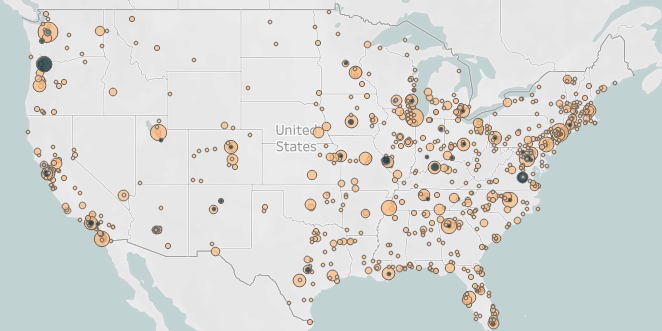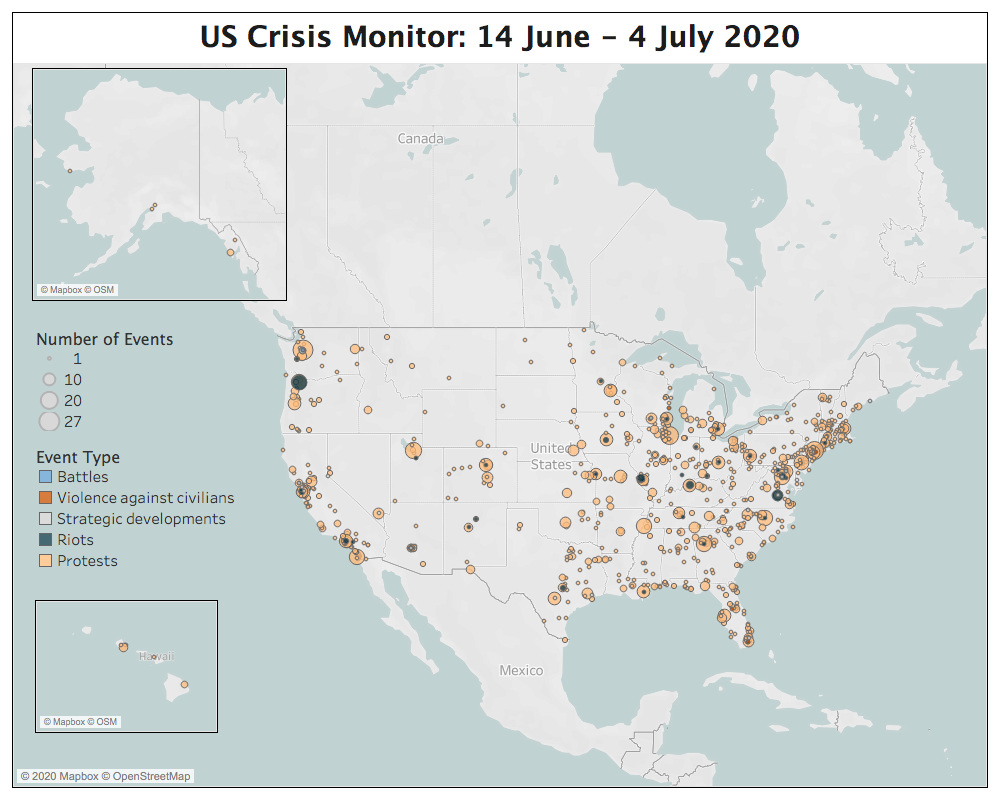9 July 2020: Amid a rising tide of political polarization, violent hate crimes, and widespread social mobilization, the United States is at heightened risk of political violence and instability going into the 2020 election. This risk is further exacerbated by an economic contraction triggered by the global COVID-19 pandemic, which may now be poised for a second wave.
Despite these indicators, there have been no initiatives to collect comprehensive data on both political violence and demonstrations across the country, impeding data-driven efforts to build community resilience, and to assess potential threats.
To address this need, the Armed Conflict Location & Event Data Project (ACLED) and the Bridging Divides Initiative (BDI) at Princeton University are launching the US Crisis Monitor. The joint project provides the public with real-time data and analysis on political violence and demonstrations in the United States for the first time, and aims to establish an evidence base from which to identify risks, hotspots, and available resources to empower local communities in times of crisis.
For BDI’s work to support community resilience ahead of the 2020 election, the US Crisis Monitor will help to fill a critical information gap by providing timely, reliable data to improve decision-making, enhance programming, and ultimately facilitate efforts to track, prevent, and mitigate political violence.
Applying ACLED’s rigorous methodology for monitoring political violence and demonstration activity around the world, the US Crisis Monitor collects data in real-time and publishes weekly updates to inform research, journalism, policymaking, and civil society initiatives. Drawing on more than 1,500 national, regional, and local sources, the first data release comprises over 1,800 total events, including over 1,790 demonstration events and over 10 political violence events, as well as 20 strategic development events that provide additional insight into potential changes to the political environment. Events are recorded in all 50 states and the District of Columbia during the three-week period from 14 June to 4 July 2020, ranging from nearly 200 in California to four in South Dakota. The vast majority of events are peaceful protests linked to the Black Lives Matter movement, which has led to a massive surge in demonstration activity across the country, with a total of nearly five times as many events recorded per week relative to ACLED’s US pilot project last summer. New data tranches will be released at the start of each week covering the previous week and supplemented with historical data for 2020 as available.
“America is not immune to political instability. The US Crisis Monitor builds on ACLED’s pilot project tracking political violence and demonstrations around the country and allows us to publicly release data on the United States for the first time, enabling cross-country comparability within our global dataset. Together with BDI’s invaluable work to support local community resilience nationwide, we hope the US Crisis Monitor will inform data-driven approaches to assessing, mapping, and ultimately reducing risk ahead of the 2020 election,” said Dr. Roudabeh Kishi, ACLED Research Director.
“The US Crisis Monitor is designed to provide new resources for BDI, and others, to help local community leaders come together ahead of the 2020 election to address and mitigate the risk of political violence in an inclusive way. There is so much more we can do now, together, to build stronger communities. We are proud to partner on this project with ACLED, a group that has distinguished itself as a leader around the world in data collection on demonstrations and political violence,” said Nealin Parker, co-director of BDI and lecturer at Princeton School of Public and International Affairs.
The US Crisis Monitor dashboard maps these events and allows users to track additional trends, flashpoints, and risk factors. These currently include: the use of state force against demonstrators, state targeting of journalists, car rammings targeting demonstrators, the presence of armed individuals at demonstrations, reports of suspected agents provocateurs at demonstrations, the targeting of statues, and events related to the COVID-19 pandemic. This interactive crisis mapping tool will be updated dynamically with the latest data as well as new spotlights and trends to watch.
The US Crisis Monitor is the only source of real-time data that captures both political violence as well as demonstrations in the United States. The project seeks continued funding to ensure that US data collection and analysis continues through the 2020 election and beyond. If you are interested in supporting this work, please contact [email protected].
A US-based 501(c)(3) non-profit organization established in 2014, ACLED is the highest quality and most widely used real-time data and analysis source on political violence and demonstrations around the world.
The Bridging Divides Initiative is based at the Princeton School of Public and International Affairs’ Liechtenstein Institute on Self-Determination at Princeton University. BDI works to support local community resilience in the United States through two main efforts, building on expertise from political and elections work around the world. First, BDI uses different tools and methodologies to track demonstrations and political violence in real time so that local communities and national organizations will be better able to address issues before they escalate. Second, BDI works to build an expansive picture of peacebuilding across the country, to highlight existing work while developing new avenues for coordination and support. BDI has an immediate focus of mitigating political violence in the US by supporting a more coordinated response around the 2020 election, while ultimately supporting longer-term solutions to societal polarization.
If you would like to use data and analysis from the US Crisis Monitor, please review ACLED’s Terms of Use & Attribution Policy. For more information about ACLED methodology and resources for analyzing the data, check the US Crisis Monitor FAQs as well as the ACLED Resources library.
For interview requests and press inquiries, please contact Sam Jones, ACLED Senior Communications Manager and B. Rose Huber, Princeton Communications Manager & Senior Writer.
© 2020 Armed Conflict Location & Event Data Project (ACLED). All rights reserved.






